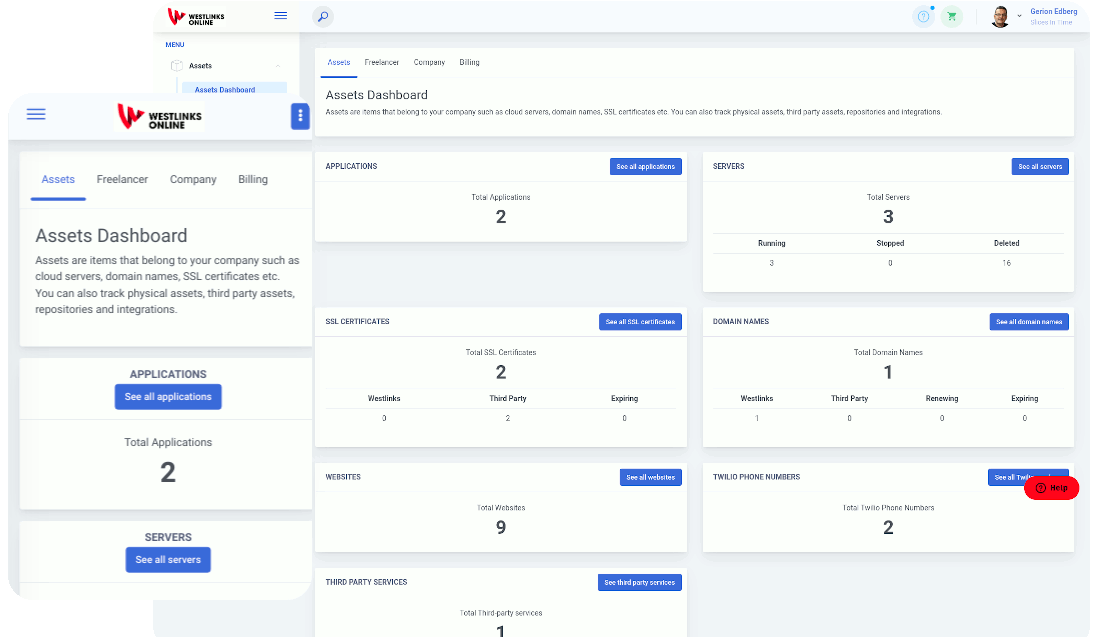
Nagios is a resource monitoring system intended for server administrators. It is highly flexible, allowing the collection and detailed reporting of server activity.
We install the latest stable version of Nagios Core on your VPS instance. After basic installation has been completed we deliver it to you at which time it is ready to use. Additional configuration and customization would be required for a fully functional system
Price includes
Domain name recommended. (more info)
Hosting fees separate. (more info)
Monthly recurring price starting at $25.00
* Monthly Price varies by server size
One Time Setup Charge: $85.00
Nagios is a resource monitoring system intended for server administrators. It is highly flexible, allowing the collection and detailed reporting of server activity. We use it here at Westlinks Online to monitor our own collection of servers which includes each of the servers assigned to customers.
Nagios is not trivial to install and configure. This installation service provides you with a ready-to-use Nagios installation with basic configuration set up. Here's what we do:
From Wikipedia
Nagios /ˈnɑːɡiːoʊs/, now known as Nagios Core, is a free and open source computer-software application that monitors systems, networks and infrastructure. Nagios offers monitoring and alerting services for servers, switches, applications and services. It alerts users when things go wrong and alerts them a second time when the problem has been resolved.
Ethan Galstad and a group of developers originally wrote Nagios as NetSaint. As of 2015 they actively maintain both the official and unofficial plugins. Nagios is a recursive acronym: "Nagios Ain't Gonna Insist On Sainthood" - "sainthood" makes reference to the original name NetSaint, which changed in response to a legal challenge by owners of a similar trademark. "Agios" (or "hagios") also transliterates the Greek word άγιος, which means "saint".
Nagios was originally designed to run under Linux, but it also runs well on other Unix variants. It is free software licensed under the terms of the GNU General Public License version 2 as published by the Free Software Foundation.
In 2006 a survey asked members of the nmap-hackers mailing-list to identify their favorite network-security tools. In the survey 3243 people voted; Nagios came in 67th overall and 5th among traffic-monitoring tools. (Nmap itself was excluded from the list.) Another survey, in 2011, placed Nagios at 69th place.
Nagios Core is open source software licensed under the GNU GPL V2.
Currently it provides:
NRPE
Nagios Remote Plugin Executor (NRPE) is a Nagios agent that allows remote system monitoring using scripts that are hosted on the remote systems. It allows for monitoring of resources such as disk usage, system load or the number of users currently logged in. Nagios periodically polls the agent on remote system using the check_nrpe plugin.
NRPE allows you to remotely execute Nagios plugins on other Linux/Unix machines. This allows you to monitor remote machine metrics (disk usage, CPU load, etc.). NRPE can also communicate with some of the Windows agent addons, so you can execute scripts and check metrics on remote Windows machines as well.
NRDP
Nagios Remote Data Processor (NRDP) is a Nagios agent with a flexible data transport mechanism and processor. It is designed with an architecture that allows it to be easily extended and customized. NRDP uses standard ports and protocols (HTTP and XML) and can be implemented as a replacement for NSCA.
NSClient++
This program is mainly used to monitor Windows machines. Being installed on a remote system NSClient++ listens to port TCP 12489. The Nagios plugin that is used to collect information from this addon is called check_nt. As NRPE, NSClient++ allows to monitor the so-called 'private services' (memory usage, CPU load, disk usage, running processes, etc.) Nagios is a host and service monitor which is designed to inform your network problems.
NCPA
The Nagios Cross Platform Agent is an open source project maintained by Nagios Enterprises. NCPA installs on Windows, Linux, and Mac OS X. Created as a scale-able API that allows flexibility and simplicity in monitoring hosts. NCPA allows multiple checks such as memory usage, CPU usage, disk usage, processes, services, and network usage. Active checks are queried through the API of the "NCPA Listener" service while passive checks are sent via the "NCPA Passive" service.
Our support form has been removed from the homepage due to abuse from out of control spambots.
But rest assured that logged in members have full access to our helpdesk. Westlinks is devoted to providing awesome support that you can count on
Please log in to submit a support ticket. Thanks.
Please visit our registration page to create your account.
